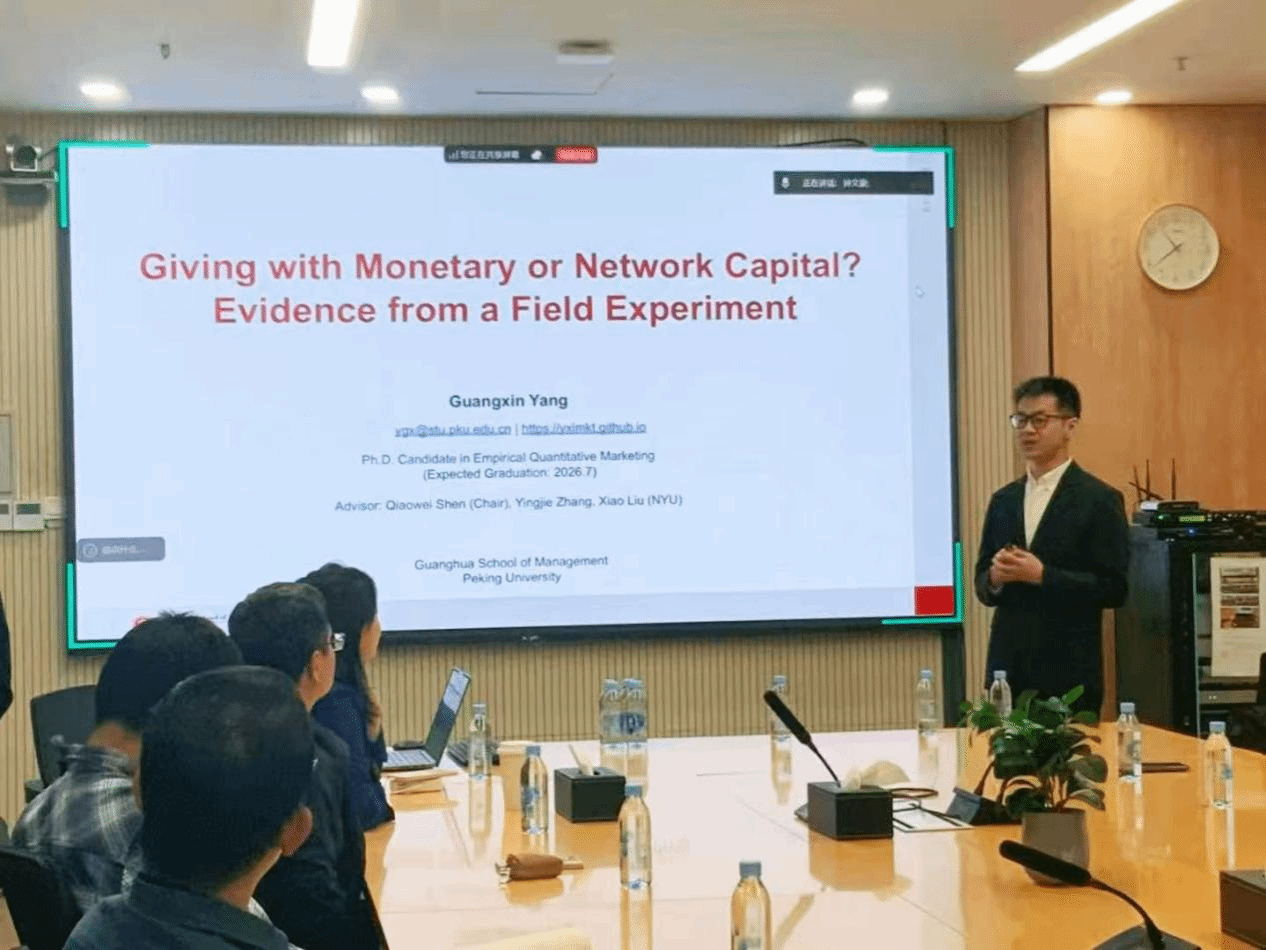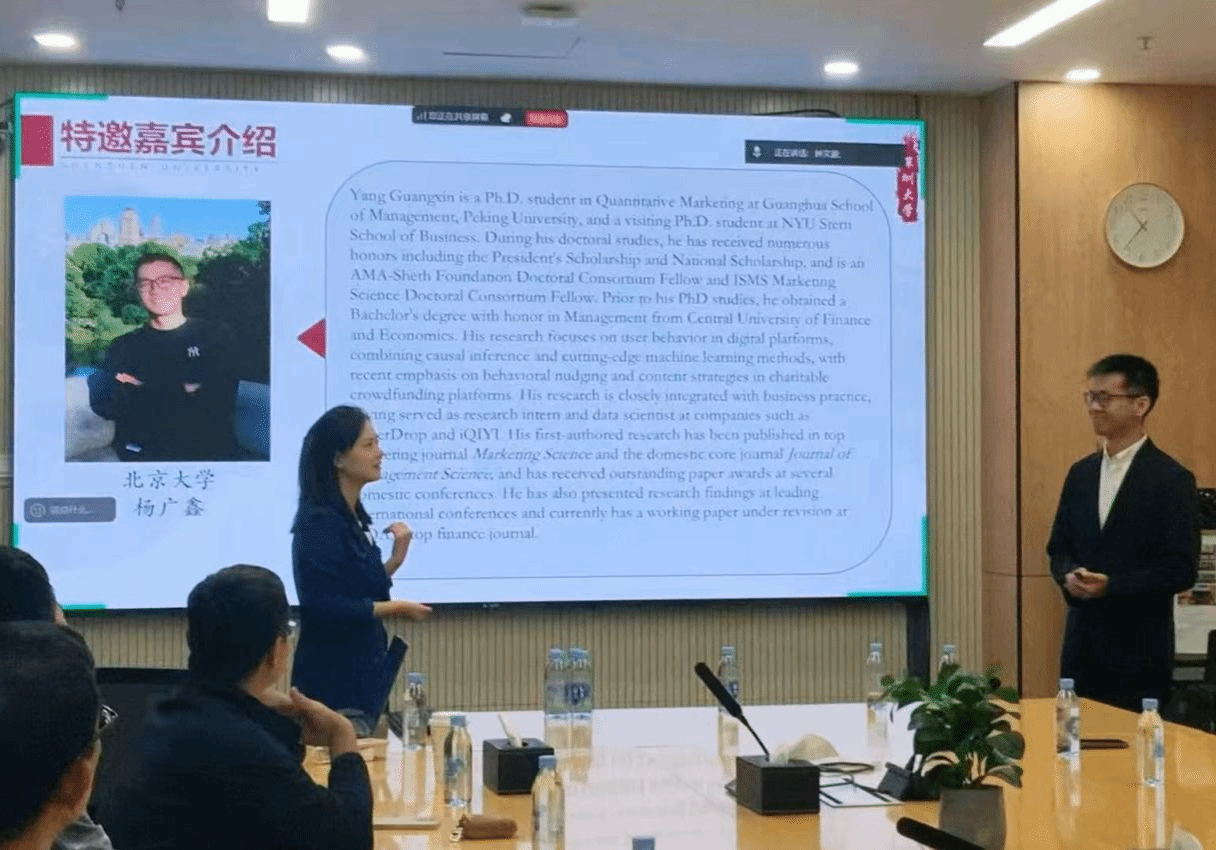On the morning of October 21, 2025, the 13th Session of the 2025 Youth Scientists Forum Series of the School of Management was successfully held in Room A302 of Mingli Building. Chaired by Professor Chen Xingyu, Vice Dean of the School of Management, the forum specially invited Dr. Yang Guangxin from the Guanghua School of Management, Peking University, to deliver an academic report titled "Giving with Monetary or Network Capital? Evidence from a Field Experiment". The forum received a warm response, attracting over 40 teachers and student representatives both online and offline.

Dr. Yang Guangxin focuses his core research on user behavior on digital platforms and is proficient in combining causal inference with cutting-edge machine learning methods. As the first author, he has published papers in top international marketing journals such as Marketing Science and core domestic journals like Management Science. Many of his studies have won excellent paper awards at domestic academic conferences, and he has also presented his achievements at top international academic conferences.
Dr. Yang's report was logically rigorous with detailed cases, presenting a high-quality academic research paradigm to the teachers and students present. Centering on the core pain points of charitable crowdfunding, he put forward three key research ideas. Firstly, he redefined the dual forms of charitable participation: in addition to the traditional "monetary donation", "social capital donation" (i.e., sharing crowdfunding information through social platforms) is an equally important way of support. Data from platforms such as Shuidichou shows that 64% of donations from strangers come from social sharing, while the sharing rate of direct contacts is less than 17%, leaving huge room for improvement. Secondly, he verified the intervention effect of "highlighting sharing" through large-scale field experiments. In a randomized controlled experiment involving more than 260,000 platform users, the design of "highlighting the sharing button" increased the sharing rate by 6.32%. Although the direct donation rate decreased by 3.22%, after superimposing the "chain donations brought by sharing", the total fundraising amount increased by 12.8%, proving the overall value of social capital mobilization.

The interactive session of the lecture was lively. Teachers and students actively raised questions regarding "how to balance the substitution relationship between sharing and direct donation", "practical methods for measuring social capital", and "ethical boundaries of field experiments in non-profit scenarios". Dr. Yang responded that researchers should avoid regarding "monetary donation" and "social sharing" as opposing options. The substitution effect can be reduced through designs such as "guiding sharing after donation" and "customizing appeal copy according to social circles". He also emphasized that the measurement of social capital needs to be combined with platform data, and distinguish between internal and external community capital by "whether there are common contacts with the fundraiser" to ensure the accuracy of measurement.
Finally, Vice Dean Chen Xingyu of the School of Management at Shenzhen University summarized that this report deeply combines quantitative research methods with the pain points of charitable practice. It not only reveals the value of social capital in the public welfare field but also provides a complete "theory-method-practice" framework for the study of charitable behavior in the digital age, which has important reference significance for teachers and students to carry out empirical research and promote the optimization of public welfare platforms.

The Youth Scientists Forum continuously sets up "Distinguished Experts Session" and "Young Scholars Session", dedicated to building a dialogue bridge between teachers and students of the School of Management of Shenzhen University and cutting-edge researchers. Participants in this session covered multiple disciplinary backgrounds such as marketing, business administration, and data science, including senior scholars who are deeply engaged in quantitative research and young teachers focusing on public welfare innovation, fully demonstrating the strong atmosphere of interdisciplinary exchanges in the school. The forum will continue to focus on the intersection of digital economy and social public welfare, stimulate scientific research innovation through regular academic activities, and contribute to the talent cultivation and the improvement of academic influence of the school.

